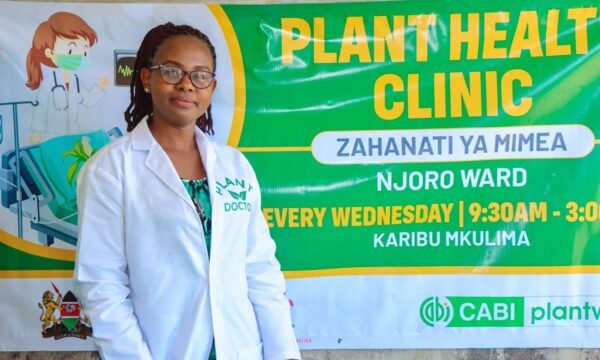- Plant doctor uses tablet to enter the data
- Plant doctors dissect a sample and discuss with farmer for diagnosing the issue.
- Farmers are waiting in queue to get advice from plant doctors
- Plant doctors dissect a sample for diagnosis
- A banner is used to advertise the Crop Clinics.
- Deputy Provincial Director, Mr. T. Yogeswaran uses megaphone to make announcement
- The plant doctor team is busy in advising the farmers on their plant health problems.
It is generally accepted that early morning is the best time to learn and retain new information. As the saying goes: “the early bird gets the worm.” This long-held belief is being applied in Vavuniya, Sri Lanka, where plant clinics are now conducted at the crack of dawn. The plant clinics are a platform for adult learning, where farmers are taught to follow Integrated Crop Management (ICM) principles to address crop health issues.
Vavuniya is one of the large districts in Sri Lanka’s Northern Province and agriculture is the backbone of its economy. Around 28,605 farming families live in the district (15.8% of the total population) and crops cultivated include paddy, vegetables, legumes, oil crops and fruits. Crop health issues are a major concern in the area and farmers are keen to seek crop management advice from plant doctors. The plant clinics are usually conducted once or twice a month around noon at agricultural extension centers. There are ten clinics covering the district, six of which have been equipped with tablets. Attendance tends to be lower during harvesting and land preparation periods as farmers are busy with field activities, but the clinics are usually very busy – especially on Fridays.
While Vavuniya district is home to many different cultures, the majority is Tamil. Friday is a sacred day for Tamils, and they tend to eat vegetarian dishes on that day. As a result, vegetable prices are higher on Fridays and farmers target that day for bringing their produce to market in the district capital. Aware of this context, Mr T. Yogeswaran, Vavuniya’s Deputy Provincial Director of Agriculture, recommended running a plant clinic at the vegetable market in the early morning hours on Fridays, to maximize outreach and educate as many farmers as possible.
The first “early morning” plant clinic was launched on 17 March 2017 at 4.30am in front of the central vegetable market in Vavuniya town. It was staffed by seven officers from the Department of Agriculture and equipped with the usual facilities: a tent, tables, chairs, extension materials, displays and megaphones. Unusual was the addition of a generator and lights – which were necessary as it was still dark! The plant clinic, which ran until 8am, was attended by around 50 farmers and was considered a major success.
Arulanandam Vakeesan, a CABI Associate, attended the clinic to talk to the farmers and plant doctors. Farmers were happy to spend 10-15 minutes attending the clinic after selling their produce and were very satisfied with the service. Plant doctors were also happy as it provided a new experience for them that sitting in a market in early morning and advising farmers. Mr Yogeswaran mentioned that as a result of the successful trial, plant doctors are keen to run “early morning” plant clinics at the market on a regular basis.
The “early morning” plant clinic trial was a first for Sri Lanka, and perhaps even a first for any Plantwise country. The local team worked very hard and their effort ensured the trial was successful. It will become a regular fixture in Vavuniya but could be applied anywhere.
Contributed by Arulanandam Vakeesan, CABI Associate
Related News & Blogs
Training Sri Lanka’s agro-dealers in pesticide risk reduction
Agro-dealers provide vital support to Sri Lanka’s farmers. These agricultural input suppliers are often the first point of contact for smallholders who need advice on plant protection products. However, agro-dealers often lack formal training in safer…
3 July 2025











